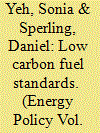|
|
|
Sort Order |
|
|
|
Items / Page
|
|
|
|
|
|
|
| Srl | Item |
| 1 |
ID:
137697


|
|
|
|
|
| Summary/Abstract |
The CA-TIMES optimization model of the California Energy System (v1.5) is used to understand how California can meet the 2050 targets for greenhouse gas (GHG) emissions (80% below 1990 levels). This model represents energy supply and demand sectors in California and simulates the technology and resource requirements needed to meet projected energy service demands. The model includes assumptions on policy constraints, as well as technology and resource costs and availability. Multiple scenarios are developed to analyze the changes and investments in low-carbon electricity generation, alternative fuels and advanced vehicles in transportation, resource utilization, and efficiency improvements across many sectors. Results show that major energy transformations are needed but that achieving the 80% reduction goal for California is possible at reasonable average carbon reduction cost ($9 to $124/tonne CO2e at 4% discount rate) relative to a baseline scenario. Availability of low-carbon resources such as nuclear power, carbon capture and sequestration (CCS), biofuels, wind and solar generation, and demand reduction all serve to lower the mitigation costs, but CCS is a key technology for achieving the lowest mitigation costs.
|
|
|
|
|
|
|
|
|
|
|
|
|
|
|
|
| 2 |
ID:
121260


|
|
|
| 3 |
ID:
099300


|
|
|
|
|
| Publication |
2010.
|
| Summary/Abstract |
Performance-based low carbon fuel standards (LCFS) of the type implemented in California and being adopted in the European Union, are a promising policy approach for decarbonizing transport fuels and reducing fossil fuel use. This paper examines the efficacy of LCFS policies, along with four major challenges that threaten their effectiveness. These challenges include leakage and shuffling of greenhouse gas (GHG) emissions, impacts on energy security, increased GHG emissions due to global land use conversion (indirect land use changes), and sustainability issues associated with biofuel production. We identify complementary policies that mitigate the severity of these challenges, while noting that some of these challenges are inherent to carbon and alternative fuel policies.
|
|
|
|
|
|
|
|
|
|
|
|
|
|
|
|
| 4 |
ID:
121266


|
|
|
|
|
| Publication |
2013.
|
| Summary/Abstract |
The use of biofuels can increase land competition, leading to global land use change (LUC). LUC poses risks such as increased greenhouse gas emissions and food prices. The magnitude of the risk is uncertain, but could be significant. Given these uncertainties and risks, we suggest that policymakers pursue a mix of the following three strategies: (1) promote feedstocks that rely less on land; (2) reduce LUC risk for land-using feedstocks; and (3) stimulate investments that increase land productivity and environmental protection. To realize these three strategies, we recommend that policymakers distinguish among feedstocks based on LUC risk; explore certifying production that avoids land competition; and adopt policy mechanisms that encourage investments in LUC-prone areas. We favor including feedstock-specific LUC emissions estimates in policies despite relatively large scientific uncertainty. While misleadingly precise, point estimates can be selected from science-based ranges to directly link LUC policy to emissions and provide strong transparent signals to biofuel investors. LUC emissions estimates can be updated regularly (~3-5 years) to reflect improvements in scientific understanding, and global changes in policy and economic environments. With or without LUC emissions point estimates, additional policies, some outside the biofuel sector, will be needed to pursue the three strategies above.
|
|
|
|
|
|
|
|
|
|
|
|
|
|
|
|
| 5 |
ID:
150045


|
|
|
|
|
| Summary/Abstract |
A low carbon fuel standard (LCFS) is a market-based policy that specifies declining standards for the average lifecycle fuel carbon intensity (AFCI) of transportation fuels sold in a region. This paper: (i) compares transportation fuel carbon policies in terms of their economic efficiency, fuel price impacts, greenhouse gas emission reductions, and incentives for innovation; (ii) discusses key regulatory design features of LCFS policies; and (iii) provides an update on the implementation status of LCFS policies in California, the European Union, British Columbia, and Oregon. The economics literature finds that an intensity standard implicitly taxes emissions and subsidizes output. The output subsidy results in an intensity standard being inferior to a carbon tax in a first-best world, although the inefficiency can be corrected with a properly designed consumption tax (or mitigated by a properly designed carbon tax or cap-and-trade program). In California, from 2011 to 2015 the share of alternative fuels in the regulated transportation fuels pool increased by 30%, and the reported AFCI of all alternative fuels declined 21%. LCFS credit prices have varied considerably, rising to above $100/credit in the first half of 2016. LCFS programs in other jurisdictions share many features with California's, but have distinct provisions as well.
|
|
|
|
|
|
|
|
|
|
|
|
|
|
|
|
|
|
|
|
|